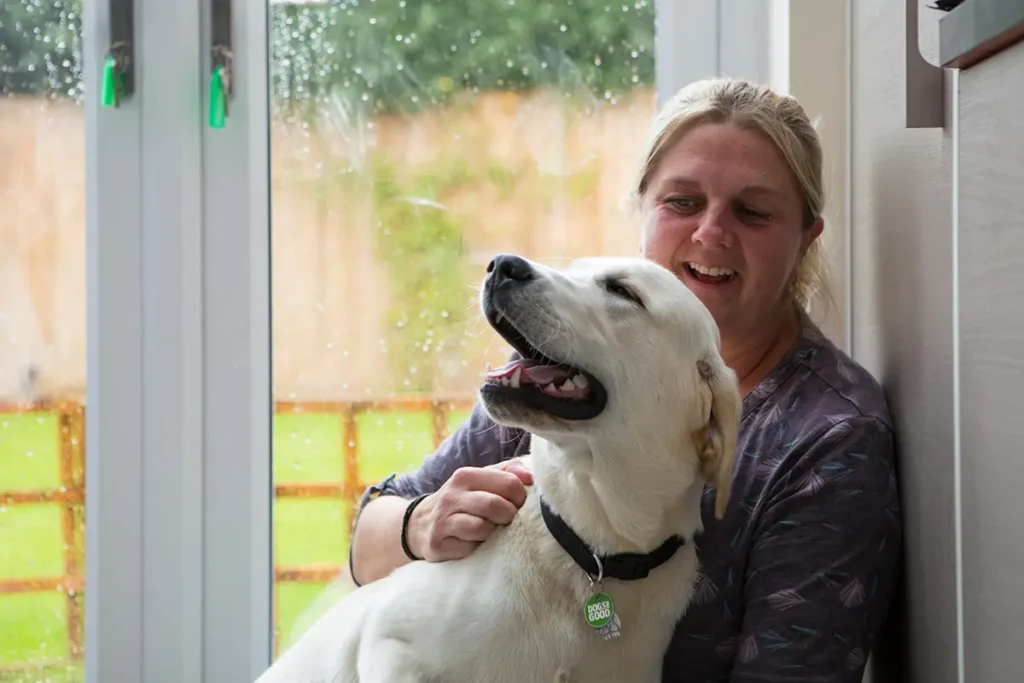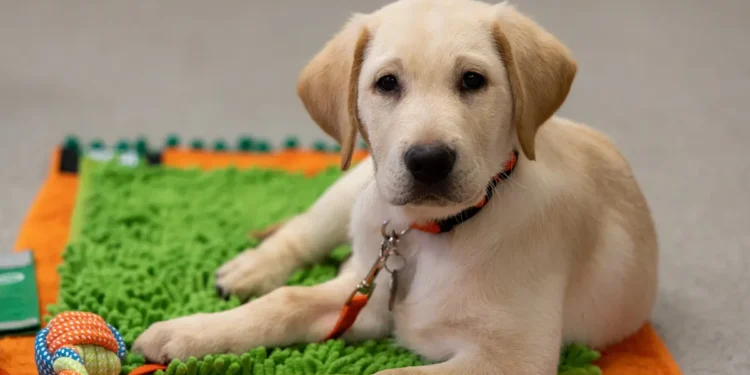The pitter patter of puppy paws holds a lot of hope for the future. And when those pups are being raised by volunteer puppy socialisers for Dogs for Good, their futures are full of possibility.
These important puppies will go on to transform lives, bringing improved health and independence to people with a range of needs. They may go on to become an assistance dog, providing one-to-one support for someone with a disability or autism, or a community dog working to achieve goals with a range of people. But for now, they’re just little pups taking in the world one sniff at a time.
Volunteer Needs at Dogs for Good
Dogs for Good is desperately seeking more volunteers to help look after its dogs. Without happy, confident puppies who thrive in a variety of different environments, the charity can’t help make life possible for the people it supports.
Costs such as vet bills, food etc are covered by the charity so all you really need is a big heart, a safe and secure home and the time to spend looking after a puppy.
Experience of Volunteer Socialisers
Dawn and Gary are volunteer socialisers with Dogs for Good and took on their first puppy, Oona at eight weeks old. They will look after, guide and nurture her until she’s around 18 months old and ready to be trained by Dogs for Good for her future life as a working dog. “Puppies really just need help to learn how to behave in the world. So that means plenty of trips out, to gain experience of life,” says Dawn. “While it sometimes means mandatory trips for cake at a coffee shop or down the pub for a pint – tough job! – it also sometimes means more basic exposure like sitting at a road watching traffic go by. All these experiences help puppies grow into confident, happy dogs.”
Newly retired and looking to do something to give back Dawn and Gary have found socialising incredibly valuable for their wellbeing. It encourages them to get out of the house while playing to their strengths as a couple. “One of us tends to do the trips to the shops, while the other tends to do the walking,” continues Dawn. It also means they’ve joined a welcoming network of volunteers across their region, all of whom are going through the ups and downs of puppyhood while supported by one of our expert puppy coordinators.

Diversity Among Socialisers
Dogs for Good’s socialisers are diverse, ranging from single people in their twenties or young families to retired couples. Each family finds a puppy brings something different into their life, but all find it rewarding. Emma, a mother with a young family, has supported six dogs through their early training, as well as countless others as a temporary boarder. “Not only does caring for a Dogs for Good puppy provide a chance to make a difference to someone’s life, it’s an opportunity to make friends and get lots of puppy cuddles along the way!” she says. “Socialising is a marathon, not a sprint – but it’s lovely to watch the puppy’s personality develop and seeing how quickly they learn the ropes.”
Monthly Puppy Classes
Each volunteer socialiser is asked to attend a monthly puppy class run by the charity’s dedicated team of puppy coordinators. These experienced professionals help guide socialisers through the ups and downs of raising any puppy – teaching basic obedience and recall, introducing new sights and experiences, and ensuring they’re happy around humans and other dogs.
Each class is structured to start laying the foundations so that the pup is set up for its future life as a working dog and to nurture volunteers to support their puppy through that process. Not all will make the grade as an assistance or community dog, but the foundations from the classes are essential to create any happy, healthy dog.
The Emotional Farewell
Of course, saying goodbye to the pup you’ve raised is never easy. Dogs for Good puppy coordinator, Helen Townsend says: “Before working at Dogs for Good, I was actually a puppy socialiser for the charity, so I know that saying goodbye is tough. But knowing that the pup you’ve loved will go on to make life possible for someone is such a special feeling. Volunteers are kept up to date with how their pup is doing in training and sometimes, they’ll get to meet the person the dog has been partnered with. Then you see the difference, first hand, and that makes everything totally worthwhile. And you could always then say ‘hello’ to another puppy and start the process over again, like so many of our volunteers do!”
To find out more, please visit Dogs for Good’s website: www.dogsforgood.org and click on ‘Get Involved’. Alternatively, call 01295 252600.










